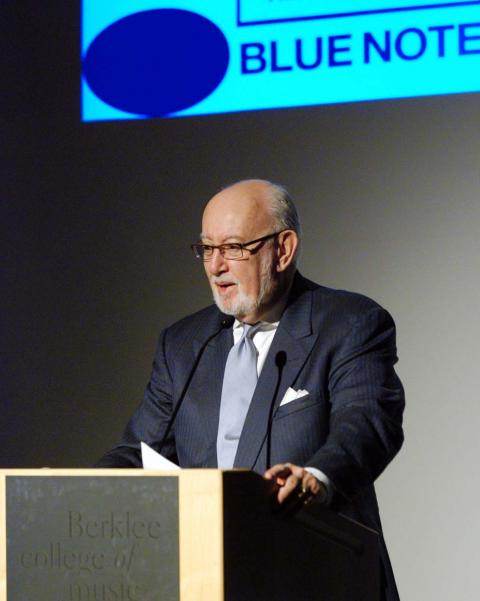Blue Note CEO at Berklee

Bruce Lundvall
Phil Farnsworth
During his February address for the annual James G. Zafris, Jr., Distinguished Lecture for Music Business/Management series, Bruce Lundvall, president/CEO of the Blue Note Label Group, discussed his decades of experiences in the music industry working at several different record labels. He spoke of his love for his work and how even at the age 71, he has no plans to quit. “I want to do this ’til I die,” he told the audience packed into the David Friend Recital Hall.
Lundvall related that he became interested in jazz at a young age and was hopeful about landing a job at a record label after graduating from college. He had told Bill Gallagher, then head of marketing at Columbia Records, that he would work for free. “I called Bill from Grand Central Station,” Lundvall recalled. “I said, ‘I have a job offer, but I want to work for Columbia Records. I’ll work for nothing if you’ll pay my bus fare.’ Gallagher said, ‘We'll get back to you tonight.’ I thought, ‘This will never happen.’ But he called back and said, ‘You start Monday morning at $85 a week.’ The happiest single day of my life was that day.”
During his 43 years in the record business, Lundvall has signed such diverse artists as Rubén Blades, Paquito D’Rivera, Stan Getz, Dexter Gordon, Herbie Hancock, James Taylor, Dianne Reeves, Peter Tosh, Dexter Gordon, and many more.
He spoke of signing the best-selling artist of his career several years ago after an accountant at Columbia asked Lundvall to listen to a singer she knew, and assured him the girl was special. A meeting was set up, and the accountant brought Norah Jones to his office. She had a great demo and Lundvall acted immediately.
“I told her, ‘I’m signing you to Blue Note Records,’’’ Lundvall said. “Those kinds of things never happen—but it did happen that day. As with previous artist signings, Lundvall’s instincts were right. He told the audience that to date, Jones had sold 32 million CDs.
Lundvall spoke about the rationale for signing new talent. “Wayne Shorter really had the proper way of phrasing what you think about when you sign an artist,” Lundvall stated. “He said, ‘Don’t follow shadows; shadows follow you.’ In other words, go with originality, go with people who have a vision and their own point of view.”
—Jason Roeder



